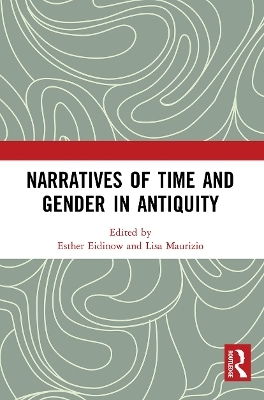
Narratives of Time and Gender in Antiquity
Routledge (Verlag)
978-1-032-47486-1 (ISBN)
Each chapter in this collection places gender at the center of its exploration of time, and the volume includes time in treatises, genealogical lists, calendars, prophetic literature, ritual practice and historical and poetic narratives from the Greco-Roman world. Many of the chapters begin with female characters, but all of them emphasize how and why time is an integral component of ancient categories of female and male. Relying on theorists who offer ways to explore the connections between time and gender encoded in narrative tropes, plots, pronouns, images or metaphors, the contributors tease out how time and gender were intertwined in the symbolic register of Greek and Roman thought.
Narratives of Time and Gender in Antiquity provides a rich and provocative theoretical analysis of time—and its relationship to gender—in ancient texts. It will be of interest to anyone working on time in the ancient world, or students of gender in antiquity.
Esther Eidinow is Professor of Ancient History at the University of Bristol, UK. She has particular interest in ancient Greek religion and magic, and her publications include Oracles, Curses, and Risk among the Ancient Greeks (2007), Luck, Fate and Fortune: Antiquity and its Legacy (2010), and Envy, Poison, and Death: Women on Trial in Classical Athens (2016). She is interested in using anthropological and cognitive approaches to ancient evidence, and is the co-founder and co-editor in chief of the Journal of Cognitive Historiography. Lisa Maurizio is Professor of Classical and Medieval Studies at Bates College, Maine. She is interested in interplay between gender, oral poetry, and Greek religion, and she has published articles on Delphic divination as well as Classical Mythology in Context (2015). Her adaptations of Greek tragedies Tereus in Fragments and the Memory of Salt have been produced by the Animus Ensemble in Boston. She is currently working on a digital edition of Delphic oracles that acknowledges their oral composition and transmission.
1. Women’s Tangible Time: Perceptions of Continuity and Rupture in Female Temporality in Homer 2. Atalanta and Sappho: Women In and Out of Time 3. Feminizing aiōn ("Life" / "Lifetime") in Pindar’s Epinikians 4. Gendered Time and Narrative Structure in Herodotos’ Histories 5. Time and Gender in Epic Quests and Delphic Oracles 6. Gendered Patterns: Constructing Time in the Communities of Catullus 64 7. Delia’s Saturnian Day: Gender and Time in Tibullan Love Elegy 8. Eating up Time in Ovid’s Erysichthon Episode (Metamorphoses 8.738-878) 9. Telling Time with Epiphanius: Periodization and Metaphors of Genealogy and Gender in the Panarion 10.(En)Gendering Christian Time: Female Saints and Roman Martyrological Calendars
| Erscheinungsdatum | 13.01.2023 |
|---|---|
| Verlagsort | London |
| Sprache | englisch |
| Maße | 156 x 234 mm |
| Gewicht | 294 g |
| Themenwelt | Geschichte ► Allgemeine Geschichte ► Vor- und Frühgeschichte |
| Geschichte ► Allgemeine Geschichte ► Altertum / Antike | |
| Geisteswissenschaften ► Philosophie | |
| Geisteswissenschaften ► Religion / Theologie ► Weitere Religionen | |
| ISBN-10 | 1-032-47486-6 / 1032474866 |
| ISBN-13 | 978-1-032-47486-1 / 9781032474861 |
| Zustand | Neuware |
| Haben Sie eine Frage zum Produkt? |
aus dem Bereich


